Blog
What I’ll Remember: Interning at WRQC
Sloane wraps up her time by sharing what she’s learned during interning across multiple programs at World Relief Quad Cities.
My time as an intern has come to an end. Only a short 300 hours later, I can cross off an internship experience that works towards my degree: Multimedia Journalism Mass Communication (MJMC). I’m thankful to have been given this opportunity.
At World Relief Quad Cities, I have worked in a lot of different programs. I started off helping caseworkers in the Afghan Placement and Assistance program. I was introduced to the process of casework and everything that goes along with Afghan resettlement.
Meeting families and helping them out was an awesome experience, and very rewarding. The work that goes on at World Relief Quad Cities truly changes clients’ lives.
I’ve been interning in Communications at the same time and have done a lot with it. Comms gave me the chance to interview amazing people in the Quad Cities for multiple stories, and I feel like my writing has made a difference. I also really enjoyed working with social media.
During the last few weeks of my internship, I worked with Family Literacy. I loved helping out with childcare and spending time with the kids. The parents and children seemed to really bond over learning together.
This internship gave me a world of experience and I am very grateful to have been part of the team. When looking back at my time I had with World Relief Quad Cities, I can only think of good things.
I remember going to help out families and taking them grocery shopping. I remember interviewing awesome people in the community and learning how they give back and what World Relief offers the Quad Cities. And I remember working with the kids for the Family Literacy program, creating a bond, and having fun.
After this, I will continue to work towards my degrees in MJMC and Creative Writing at Augustana College. I’m not sure what the future holds for me, but I’m so glad I got to get this experience and work with amazing people that really love what they do.
Thank you to everyone at World Relief for what they have offered for me!
Interested in interning for WRQC? Fill out an internship application.
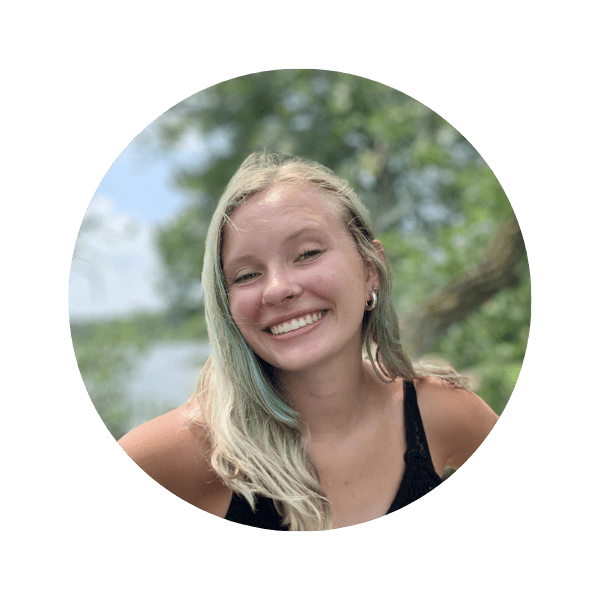
Sloane McIlrath interns with the APA and Communications team at World Relief. She is a senior at Augustana College majoring in Creative Writing and Multimedia Journalism Mass Communication. She wants to share people’s stories and bring more awareness through her writing.
Meeting with Rep. Miller-Meeks: A step towards the path to safety
WRQC intern Rubens Gonzales discusses his trip to meet Rep. Miller-Meeks and gives his perspective on the Afghan Adjustment Act.
A legal path to safety
Last month, I was lucky enough to be invited to attend a special meeting with WRQC and Representative Miller-Meeks to talk about the Afghan Adjustment Act that was recently introduced in the Senate.
The bill would provide a legal adjustment process for the tens of thousands of Afghan evacuees relocated from Afghanistan and resettled into local American communities. It includes those who supported U.S. missions in Afghanistan over the last 20 years, since the U.S. withdrawal from the country back in August 2021.
On the way to Pella, Iowa, I rode with Afghans who have experienced displacement as refugees over the last couple of years. They wanted to give voice to the new Afghan community. More importantly, they were there to offer gratitude to representatives such as Miller-Meeks who advocate for a much more efficient legal process for resettling Afghan refugees here in the United States.
During the trip, I could see and hear how nervous some of the Afghans were. They were unsure how to tell their story.
*It is important to remember that harsh traumas and experiences have made it hard for them to recall the events that led them to where they are now. In respect to their privacy, I will refer to them anonymously.
“How are you feeling, are you ready?” I asked the man sitting next to me on the way to the Vermeer Global Pavilion.
“No, I really do not want to talk about this because it is not easy for me. I get sad just thinking about this, but I know that there will be good behind this,” he said.
The early stages of the bill
Event organizers greeted us when we arrived and led us to the meeting room. After settling down for a couple of minutes, the meeting started with introductions.
There were several groups attending the meeting. One was Rep. Miller Meeks and her staff. Another was the business sector, who were mostly representing big companies that were willing to talk about job opportunities. The other corners were taken up by World Relief, Lutheran Social Services, and the National Immigration Forum. The Afghans sat beside Laura Fontaine, our director, and the meeting began.
The meeting started with Rep. Miller Meeks explaining what is happening inside the House, and how they plan to pursue the Afghan Adjustment Act. She said the bill is still in its early stages because it was just introduced, and because they have yet to gather support from other members of the House. Nonetheless, she tells everyone that her office is working very hard, along with several other members of the House who advocates for the same cause.
Rep. Miller-Meeks shared her background as a military veteran who worked closely with Afghans during her time of service. Her experience reinforced her empathy and understanding for Afghan refugees.
After Rep. Miller-Meeks introductory statement, she gave the floor to the Afghans to speak their parts. Five members of the Afghan community shared powerful stories with similar obstacles. They expressed concerns about family, financial struggles, difficulties in coping with trauma, and frustrations regarding the slow legal process of their cases.
What it’s like to be forcibly displaced
“Everyday, we try our best to bury the thoughts in our head. But at the end of the day when it’s time to rest, I can only think about my family who I left behind.”
“My kids ask me all the time when we can all be together again. It is hard for me to hear that they are counting every second that they are away from me.”
“It’s hard to explain to people that coming back is not an option for us. When we were forced to leave, I burned all my documents. Once we set foot back in Afghanistan, they will take my life and my family’s.”
“Behind the smile that we put on our face is the constant thought of us worrying for the lives of our friends, families, and loved ones back home. Their lives are in constant danger and we cannot do anything about it.”
These were just some of the remarks that I remember from stories told by the Afghans. Through their voice, I could feel how difficult it is for them to be where they are right now.
Looking ahead
Following the powerful statements of the Afghans, we came back to Rep. Miller-Meeks to share her empathy for their situations. She said she understood what they were feeling and would do everything she could to rally up support in the House and pass the bill.
After that, the business sector was brought into the conversation. They were excited to welcome new refugees because of the ongoing labor crisis happening in Iowa. They expressed that many jobs are available for refugees to take if they are in search of employment.
There was time for clarifications, questions, and concerns before the meeting ended. All in all, everyone felt that they were in good hands with Rep. Miller-Meeks presence and support. The Afghans hold hope for brighter days as they look forward to a more efficient legal process and to finally reunite with their loved ones after years of separation and displacement.
As a political science major, this experience was truly an eye-opener for me as I was given the chance to hear how politics work inside the House. I heard about the realities of party polarization happening here in the United States. This makes policy making very intricate, which also means that there is no definitive timeline for when exactly this bill can be passed.
Lots of lobbying and convincing needs to be done in and outside of the senate before refugees can actually reap the benefits of the Afghan Adjustment Act.
Visit our advocacy page to write to your representatives and ask them for their support of the Afghan Adjustment Act.

Rubens Gonzales interns with Immigration Legal Services team at World Relief Quad Cities. He is a senior at Augustana College majoring in Political Science and Asian Studies. He plans to attend law school after graduating and pursue Immigration Law.
Who Is World Relief Spokane?
World Relief Spokane is a refugee resettlement agency, working in connection with the local community, to create a welcoming space for people fleeing persecution and violence in their countries of origin.
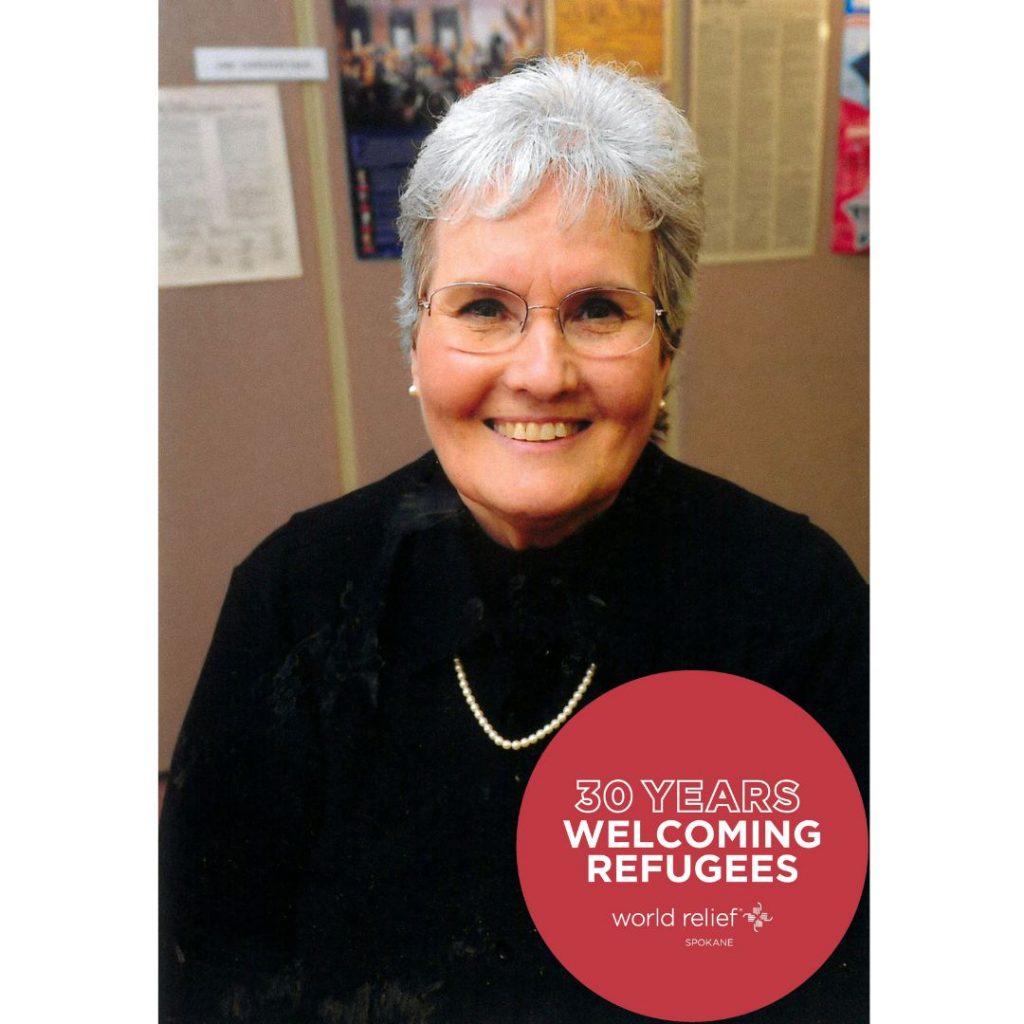
The Spokane office was started in 1992 by Linda Unseth, which means 2022 marks 30 years of resettlement work. In those 30 years, more than 11,000 immigrants have been welcomed to Spokane. Our parent organization, World Relief global, is working to address the causes of mass displacement – extreme poverty, disasters, war, violence and oppression – throughout the world.
One-Stop Shop
World Relief Spokane is a full-service resettlement agency – providing clients with housing assistance, connection to resources, job coaching, and extended case management.
We are the humanitarian arm of the National Association of Evangelicals, and as such, we believe welcoming the stranger is part of our biblical call to love our neighbor and spread the good news of Jesus’ love and mercy. We know that we cannot do this alone, and so, we are committed to engaging the local church, providing them with resources and inviting them to stand alongside refugees seeking to build new lives in Spokane.
Four Core Competencies
RESETTLEMENT – World Relief Spokane works with new arrivals from the time they land at Spokane International Airport and for the subsequent 90 days to help them find housing and to get connected with resources. In partnership with a generous community, we are able to provide new arrivals with all the essentials for setting up a home – furniture, bedding, kitchen wares, etc. The majority of former refugees come with little more than what will fit in a suitcase. Resettlement staff and volunteers connect them with benefits, medical insurance and public transportation; help to enroll their children in school; and connect adults to agencies for English language learning.
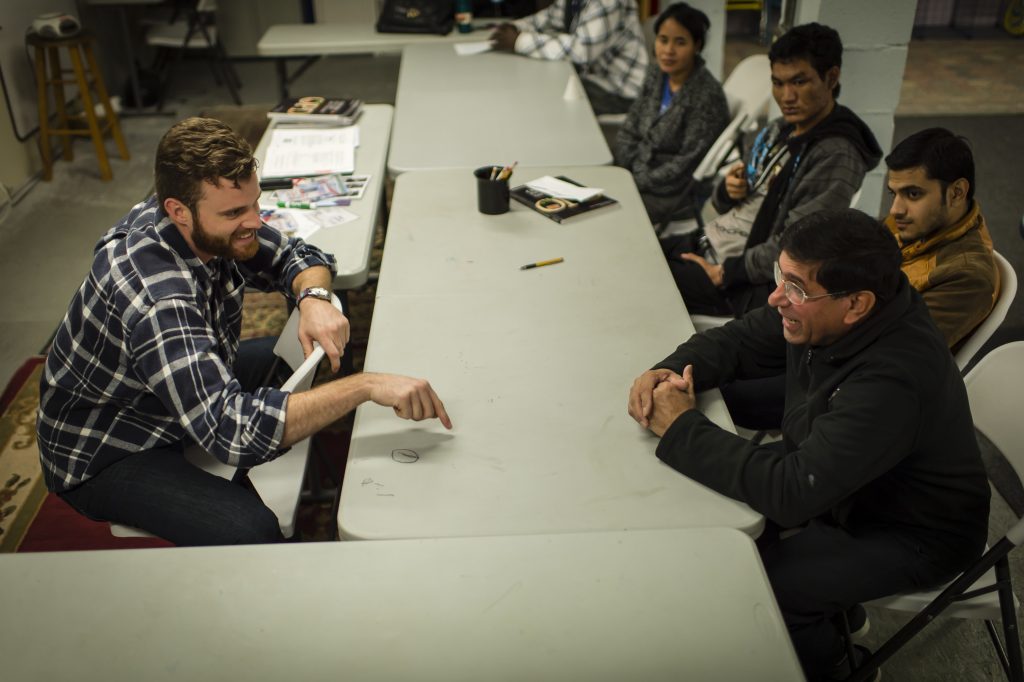
EXTENDED CASE MANAGEMENT – Not all newly arrived refugees can become self-sufficient and independent in 90 days. Many immigrants need more support. Through our Integration and Wellness department, World Relief provides case management to those struggling to get established. Case managers help clients navigate the health care system, legal resources, housing and financial management services, educational services and more. They connect clients with other agencies who provide direct services, while coaching them in accessing services and resources. The goal is to empower clients and connect them with support systems (physical, emotional, social) as they adjust to life in America.
Volunteers are a significant help in walking alongside families as they figure out their tight budgets, work on their language skills, learn the culture, and build a network of support. They often bring a wealth of experience and knowledge and, at the same time, report back that they learned and grew through the experience.
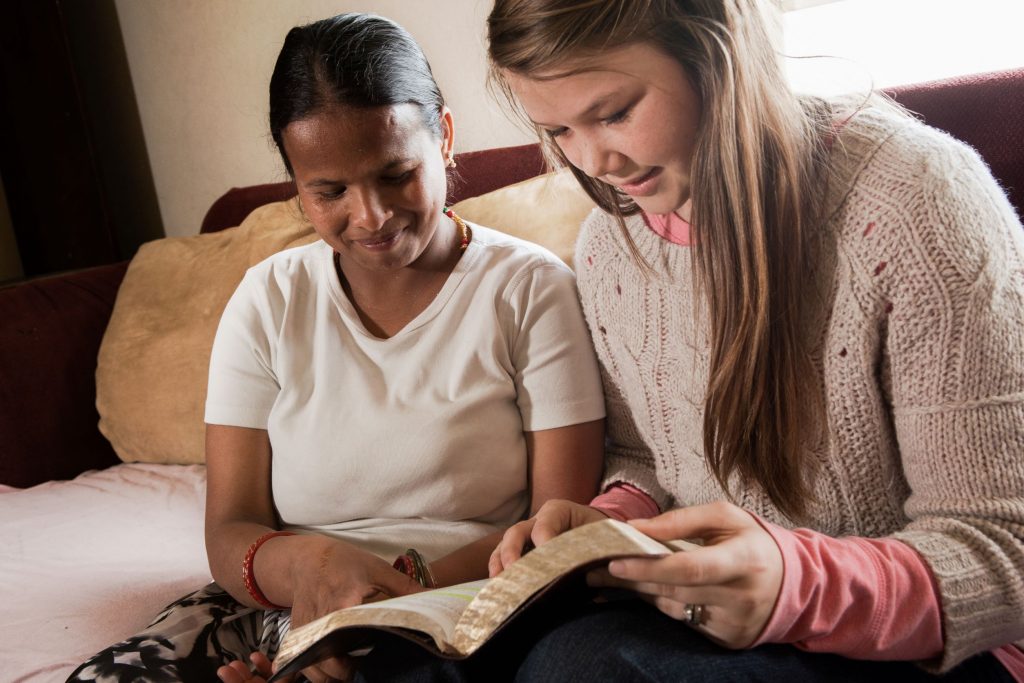
ECONOMIC EMPOWERMENT – By and large, the goal is to help each new immigrant family find employment for at least one adult in the first 90 days. The first job may be an entry-level position while the clients work on their language skills, navigate transportation and develop skills. Clients are welcome to come back at a future date when they are ready to pursue a more career-oriented position. Job Club provides clients with information and mentoring on how to find and maintain meaningful employment.
IMMIGRATION LEGAL SERVICES – Providing legal assistance to pave the way for employment authorization, permanent legal residence and citizenship. [The ILS Department of World Relief Spokane is currently on hold as we search for a new immigration attorney.]
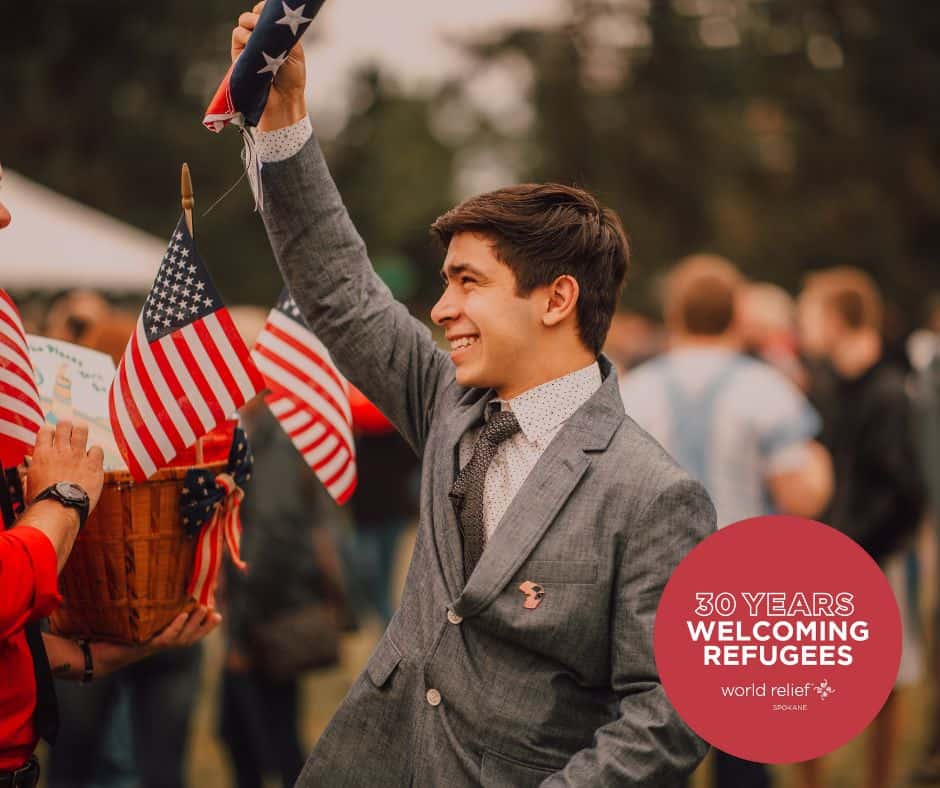
Highlights
Two relatively new initiatives – one spurred by COVID; the other by the large influx of Afghans – are the Community Ambassador program and the Education Center.
COMMUNITY AMBASSADORS provide the bridge between World Relief and the various ethnic communities. Always ready to put on a party or event to foster a sense of belonging and welcome, the Community Ambassador Team play a vital role in two-way communication with their respective communities. They let the communities know the resources and services available at World Relief and throughout the broader community. At the same time, they provide feedback to World Relief staff about the trends, capacities and needs they hear about when working with community members. Melissa Stipek, Friendship Center Manager, refers to the Community Ambassadors as “the fun side of World Relief.”
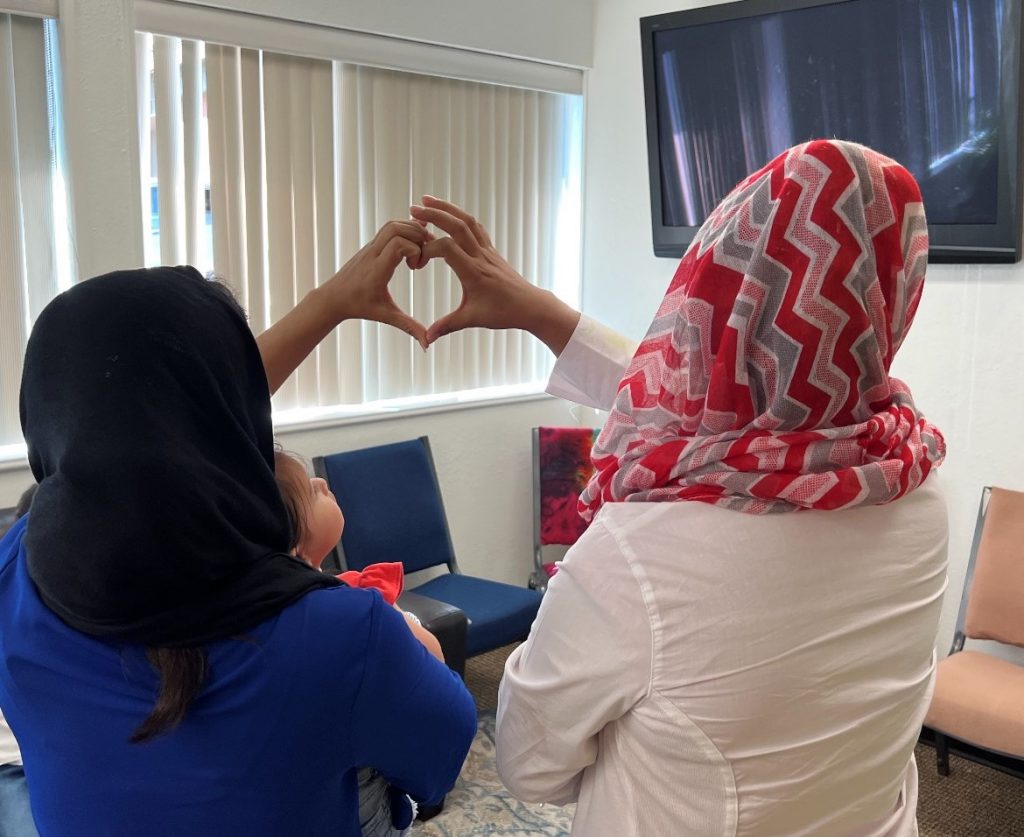
Much of what former refugees are facing is heavy — employment, housing, language studies, cultural orientation. “I believe for people to be able to flourish,” Mely said, “they need to be happy. When people are happy, their mind clears, and they are open to new ideas.”
EDUCATION CENTER – This new endeavor provides intentional education in the areas most needed by clients, helping them to integrate fully into society and become self-sufficient. First two classes: 1) basic computer skills for Afghan women; 2) financial and housing education for Afghan men. More classes are planned for the future.
FUNDING – While the government (local, state and federal) contributes financially to refugee resettlement, their funding does not go the distance. World Relief’s goal in pursuing private funding is to fill in the gaps and create a robust environment of support for our new friends and neighbors.
Become a World Relief partner today!
I Was No Longer Safe in My Country: Yomardy’s Story of Seeking Asylum
“I am from Venezuela. One of the most wonderful countries in South America.”
To an outsider, it would appear Yomardy lived an ideal life in her home country of Venezuela. Certainly not a situation to cause one to seek asylum.
After all, the terrain was beautiful and diverse with incredible views. Most of her people were kind, honest, outgoing and humble. And her professional life as an educator was nothing but impressive.
Yomardy had been honored as Venezuela’s National Teacher of the Year and accepted into the prestigious Fulbright U.S. Scholar Program. She planned to bring back extensive training and valuable knowledge from the U.S. to improve the lives of the students she served. In fact, her ultimate goal was to become Venezuela’s Vice Minister of Education.
With everything in her favor, you might wonder what could have caused Yomardy to leave a country she so deeply loved. What brought about her decision to eventually seek asylum?
An Enemy of the State
Chronic food and medicine shortages. High unemployment. A corrupt and oppressive government. And unchecked violence that gives Venezuela the highest crime rate of any country in the world. This humanitarian crisis has forced over 7 million Venezuelans to flee their country, making it one of the highest external displacement crisis globally.
Yet Yomardy hoped her time in the U.S. would equip her to better the lives of her people. Instead, it resulted in one of her worst nightmares.
While she spoke honestly and humbly about the challenges her students faced back in Venezuela, her government struck harshly back at her. It wasn’t pleased that Yomardy portrayed her leaders in an unfavorable light. Particularly while she was in a country they considered an enemy.
Ultimately, speaking the truth would have serious consequences.
A Difficult Decision
The ruthless action of her government devastated Yomardy. Her entire life – her job, her family, everything she struggled for – was back in Venezuela. It felt like she died when all that mattered was abruptly taken from her.
After her three month visit ended, Yomardy was determined to return home with her plan to help her country. However, she knew the risks. Would it really be that dangerous if she made a decision to go back?
A New Dream
With no job, no home and no relationships in the U.S., Yomardy’s fears for her future were understandable. But with the help of generous and supportive people, along with the guidance of World Relief, Yomardy rebuilt a new life.
Refusing to sit idle in her circumstances, she quickly earned her license to teach in the U.S. and now brings her passion to American students at an elementary school. She pushed on to pursue a master’s degree and aspires to become a lawyer one day.
But Yomardy hasn’t given up on her dream to become Venezuela’s Vice Minister of Education. While she optimistically waits for an opportunity to return to her country, she has created a few new dreams. Particularly one that gives back to others what was generously given to her during the most challenging time of her life.
Listen to the Full Story
Listen to Yomardy share her complete story of risk, fear, and perseverance to leave a life and country behind to seek asylum in the United States.
Serving Asylum Seekers and Asylees
World Relief Chicagoland believes that everyone deserves a chance to seek safety and a better life. Like refugees, asylum seekers like Yomardy flee their homes because of threats to their safety and well-being. But unlike for refugees, the federal government does not have financial provision for them. They must wait for a legal decision on their asylum claim. Yet they have no way to provide for themselves or their families. And this puts asylum seekers in an even more vulnerable situation.
Since 2019, World Relief Chicagoland has served asylum seekers at their most vulnerable. With your help, the H.O.M.E. program provides Housing, Opportunity, Mutuality (Transformative relationships), and Empowerment for asylum seekers in our community. Will you partner with us to serve asylum seekers today? Gather a group from your church or community to serve as a Good Neighbor Team with the H.O.M.E. program in Chicago today. This is one way you can have a life-changing impact on someone else seeking safety.
Watch other stories of transformation on World Relief Chicagoland’s YouTube channel!
More like this:
New Opportunity in the U.S.: Jenny’s Story
World Relief saved my life. Now, I’m giving back.
As a nonprofit organization, we talk a lot about donations and giving back here at World Relief Memphis. While part of how WRM functions is through government and local grants, we could not do what we do without people like you. People who are on the path, investing in the community to see mutual transformation happen in this city.
Former client and friend, Reza Abdoli, spoke with us this summer about his lifechanging experience with World Relief Memphis and why he decided to give back.
In need of help
On December 9th, 2012, I arrived in Atlanta, Georgia, as an asylee. I left my home in Afghanistan because of my country’s increasing instability, which restricted my ability to further my education.
My original intention when coming to the U.S. was to pursue a master’s degree in computer science. But I was influenced by people I knew from home to change my career to medical or dental school. There was one complication, however. They immigrated a few years prior, were already American citizens and did not explain the roadblocks I had in front of me as an asylee if I changed my career path.
Initially, I had no idea what World Relief was — they were just another faceless organization. But when I first walked into the Memphis office, that changed.
Reza Abdoli
Nevertheless, I moved to Memphis and began trying to pursue dentistry. Soon I discovered that it was impossible to participate in dental school without permanent resident status. I was at my lowest point of life, unable to get a good job and depressed.
Just a student paying back my loans without a path forward. I was driving for Uber and working other low-paying jobs, trying to make some money just to survive. Never had I been like that before, and it was scary. I needed help.
Finally, I got my USCIS approval for asylum in 2019, and they told me about some organizations that help asylees like me. That’s when I first found out about World Relief.
Initially, I had no idea what World Relief was — they were just another faceless organization. But when I first walked into the Memphis office, that changed.
A new family
That first day, there was a young lady at the door to greet me. She said, “Hey, how are you? Welcome!” I was like, she already knows me? Was she expecting me? They were so excited to meet me. It was comforting.
Before World Relief, I had so many problems traveling in the U.S. People would say hurtful words about me. It made me feel like, “this is not my place, and I have to leave here.” That feeling was only made worse by my struggles with school and money.
But my World Relief case worker, Basuze, always listened to me without judgment. He and the rest of the team acted like I was a family member. I kept coming back to the office to hang out with everyone because I felt loved.
He and the rest of the team acted like I was a family member. I kept coming back to the office to hang out with everyone because I felt loved.
REZA ABDOLI
World Relief was like a chain holding me together. I was struggling so deeply I was even planning to break up with my girlfriend because I had no money and knew I could not support us. World Relief kept my life together, and I still have my now-fiancé in my life.
World Relief pushed me to continue my education, and I returned to my passion for computers. I found the cheapest online program and got my master’s in computer science. I knew when I first came to the U.S. that I could make a living if I got a degree, but I just needed some help to get there.
Whether it was government paperwork, monetary assistance or encouragement, World Relief guided me. Through this guidance, I was finally able to get a good job.
A few months ago, I bumped into Basuze at the Memphis airport. He was there welcoming someone new who was arriving in the U.S. That was an emotional moment for me. It helped me realize how far I’d come and how much I wanted to give back.
Paying it forward
After my encounter with Basuze at the airport, I told myself that I would give a portion of my salary every month to World Relief. And every time I got a raise or promotion, I would increase my giving. And that’s what I’m doing. I’m not making millions, but I can now live without fearing the next day. And I want to do my small part to make that possible for the next person.
I give to World Relief because I’ve experienced first-hand that they use their funds wisely. Whether helping with moving, providing furniture, offering career guidance or helping financially, World Relief is putting its funds towards the good of others. Whatever is asked of them by the people they served, they step up.
I still have the check receipts of what World Relief gave to me. I still have them! That’s how much they mean to me. World Relief gave me the opportunity and the courage to pursue what I dreamt about, and it is important to me that I can be a part of making this possible for others.
World Relief gave me the opportunity and the courage to pursue what I dreamt about, and it is important to me that I can be a part of making this possible for others.
REZA ABDOLI
For me, giving back is both financial and relational. Because of my job, I’m now living in Los Angeles. Since moving here, I’ve made an effort on my own to connect with other Afghan families in my community.
When visiting with them, I always encourage the younger people to get a degree, even if it’s the cheapest one available. I didn’t spend much on my master’s degree. It was less expensive than the classes I took in dental school, which I’ve never used. But if you get a degree and find a job to support yourself, you can live the dream! It is possible here.
I feel blessed to be able to share my story with my Afghan community and people like you. I hope that my story will encourage and help others to pursue their goals.
My hope is that my story also urges people to be kinder to immigrants. They have had enough hardship in their life. When someone comes to World Relief, they are there because they seek your help. There may be language barriers and cultural differences. That’s okay. Take time to understand them. They need that. If they were in a good place in their life, they would not have come to World Relief. When someone comes to us for help, the least we can do is be more patient, be a good listener and spend more time with them.
We’re so grateful to Reza for sharing his story with us. Through generous giving such as Reza’s, our office can continue cultivating a welcoming and supportive community for refugees, asylees, and other vulnerable immigrants from across the globe. If you feel called give back and forge The Path to lasting change, follow this link for more info on how to become a Pathmaker today.

Nathan Spencer (pictured above) is a lifelong Memphian passionate about this city and its people. Through his professional internships at Choose901 and World Relief Memphis, he has worked to cultivate a connected community and serve the needs of both new arrivals to Memphis and those multi-generational residents. He also recently graduated with his M.A. in Journalism and Strategic Media.
Reza Abdoli is a former client and current donor of World Relief Memphis. While in Memphis he also served as a volunteer in various capacities at the WRM office. Since leaving Memphis, he has made a point to connect with his Afghan neighbors and advocate and mentor immigrants in his new community. He also holds a Masters degree in Computer Science and resides in Los Angeles California.
A Church Prepared
Bear Valley Community Church had been serving among refugee families in Fort Worth for several years when Kabul fell in August 2021. Seeing the devastation in Afghanistan on the news, members of the congregation became overwhelmed and desperate for ways to help, so they reached out to World Relief North Texas, where they gave practical ways to begin helping Afghans even before they arrived in the U.S.
The first step Bear Valley took was to gather and train a Good Neighbor Team. They wanted to be ready to welcome arriving Afghans when the time came. In addition to their Good Neighbor Team, they took part in a Walmart gift card drive. The church collected Walmart gift cards, and World Relief used them to provide food, furniture, clothes, and other necessities for Afghan clients as they arrived.
The Call
After weeks of waiting, Bear Valley got the call that two Afghan families would be arriving. The families were related, multi-generational and close knit with 9 people total. They already had ties in Keller and therefore were settled there so they could be close with more family. The Bear Valley Community Church Good Neighbor Team got to work!
The first thing Robert, a member of the Good Neighbor Team, remembers is taking them grocery shopping. Eric, another church member, donated furniture and showed up with a truck to help move the family in. People all over the metroplex had donated furniture to be ready for this family’s arrival. They had so much furniture donated that they had to keep some in the church and in their own homes.
“The most wonderful thing that we have seen is the people who have given for this family. They haven’t always given out of their abundance, but they’ve given because they wanted to help” Julia, another member of the Good Neighbor Team, shared with us.
A Thanksgiving To Remember
When the holidays approached, these families had not been in the U.S. for very long. Julia and the Good Neighbor Team invited them to the Thanksgiving banquet at their church. They were not sure how they would feel about this invitation, but quickly realized the family was ecstatic. The family shared, “we used to have beautiful weddings, banquets, and feasts back in Afghanistan and we have not experienced anything like that here yet.”
They enjoyed being treated as guests of honor and it became a way for Bear Valley church members to tangibly see who they had been helping and praying for.
ESL
A part of integrating into the U.S. is beginning to take English as a Second Language. The men started to attend ESL offered at Bear Valley Community Church, but the women in the family felt uncomfortable. With permission, some women from the church offered to do ESL with the women in the family in their apartment, this way they can learn English in an environment that is comfortable for them. Now, these women who do not know how to read and write in their own language, love learning English! It is amazing to see that these women have begun to learn English and are adapting so well.
The family’s 19-year-old son, Wahab, has been studying to take his GED. He was a senior in high school while in Afghanistan, and was taking his final exams to graduate high school when they fled to the U.S. His current options are to learn English and take the GED or redo high school classes. This is a reality that many young refugees face when entering a new country.
“Shopping” for Jewelry
The families have been able to explain to their Good Neighbor Team that the biggest struggle for them is remembering the lives they enjoyed in Afghanistan. They adored their lives in their home country and had no intentions of leaving until the Taliban invasion that forced them to flee. Bibi, the grandmother, was sad when she remembered special things she left behind, such as her nice jewelry.
Julia’s grandmother had been a missionary and owned jewelry from different countries all over the world. This jewelry had been passed down through the generations, to Julia now. Julia had the idea to nicely place this jewelry in a jewelry box and take it to Bibi’s house with all the girls. She wanted to make it seem as if they were jewelry shopping in a fancy store.
This ended up meaning even more to Bibi and Zakia, Bibi’s oldest daughter, than Julia could have ever imagined. The two women cried as they “shopped” for their fancy jewelry. They said to Julia, “may your jewels in heaven be multiplied for the kindness you have shown on earth.” Julia shared, “It was humanizing for them. It made them feel at home again and like they had nice things and could dress up. I know it would have meant the world to my grandmother to have these things given to people starting a new life.”
Friendships Formed
The Good Neighbor Team shared with us that the family is equally as caring of their families. The families always remember what is going on in their lives and they check up on them. “They don’t want to just be helped; they want to be part of a friendship. They don’t want to just take; but they want to give back” Julia shared. Robert shared how “one time the mom made a whole meal for me while I hooked up a new washer. It made me feel special.”
Even though it has not always been the easiest road, now that they are working and establishing themselves, they have started to become self-sufficient and their Good Neighbor Team is so proud of them. Robert shared that his desire is that they “can have a nice life here. I can’t wait to see the kids grow up, graduate, and go on to college one day.”
Personal Transformation
Julia shared that through this experience God has taught her to go outside of her comfort zone and be willing to be used in any way. “God’s plans are much richer than anything I could’ve come up with.”
She has also come to appreciate the way the body of Christ works together, for if she had decided to help this family on her own, she never could have fully helped them in the way that they needed.
Learn how you can get your church involved with World Relief HERE.
Image Before Immigrant
Earlier this year, for the first time on record, the number of forcibly displaced people in the world hit 100 million. What that means is that one in every 78 people on Earth is displaced from their home as a result of war, violence, famine, and human rights violations each day.
We’ve welcomed over 3,500 refugees into our Quad Cities neighborhood since 1999. And as a member of that neighborhood, an employee at World Relief Quad Cities, and as a Christian, that number is staggering. It’s heart-breaking.
A few things come to mind as I reflect on that number. The first is that, when we talk about the 100 million, we’re not just talking about a number, we’re talking about people. These are men, women, boys and girls – of all ages, of many different races, and of incredible individual journeys that we, as Christians, are called to engage with (Matt. 25:31-45).
This is the challenge for us, as Christians, when it comes to resettlement: to put a human face on the number, first and foremost. Otherwise, the problem has a much harder time affecting us personally, and a much easier time remaining out of sight, out of mind, and certainly not right here in the middle of our communities.
These 100 million aren’t just people “over there,” either.
While many refugees do live “over there” – across oceans in refugee camps waiting to move on to a place like America where they and their families can be safe – many of them also live right here (or soon will live right here). And I don’t just mean in the country. I mean, here in the Cities – in your neighborhood.
I believe that, as pastors and Christians in the Quad Cities, we have an important question to ask ourselves: What will we do today and in the future as an incredible opportunity to fulfill our Matthew 25 and 28 mandates sits in our own backyards?
Most importantly, though, when I think of these people, I’m reminded that they each carry something they received long before they were called “immigrant” or “refugee.”
“So God created man in His own image,
in the image of God He created Him; male and female
He created them.”
(Gen. 1:27)
The fact of the matter is that from the very beginning, God set in motion a pattern of imbedding every person that would be with a dignifying status – His own image.
Because of this, we should be reminded that when it comes to people – wherever they’re from – it’s personal to God. No amount of cultural differences, languages, national borders, or miles between us have ever diminished this certitude.
Pastors, since moving here in April I’ve had the joy of sitting down with you and talking about what God is doing in the Quad Cities, and I’ve shared with you how I believe immigrants and refugees are an integral piece of that movement among us.
Today, I want to challenge you (along with myself) with three things.
- Let’s get face-to-face. Let’s sit down with refugees and enjoy a meal together and take the time to hear their stories and to learn about their experiences with the goal in mind of being like Jesus who ate many meals with many people very different than Him. World Relief QC is here to walk alongside, and I promise it will fill you with much joy.
- Let’s impact our neighborhood. I challenge you to talk to your churches about serving the neighborhoods these refugees live in – areas like Century Woods in Rock Island. At the end of the day, doing so isn’t just filling a need or showing kindness to the foreigner among us, it’s fulfilling the Great Commission right here, right now.
- Let’s see them as image-bearers before seeing them as immigrants. When we look to immigrants and refugees in our neighborhood, let’s think and speak of them as “fearfully and wonderfully made” before the word “foreigner” crosses our minds and mouths.
I believe in the Quad Cities and its capacity to continue welcoming the foreigner and the stranger in our midst. But even more, I believe in what God is doing here, both through your churches and through our office. Would you consider partnering with us through prayer and service to bring Christ’s love to the nations in our neighborhood?
Blessings to you, today.
Feeling inspired to get involved? Schedule a conversation with Spencer. Or, request a guest speaker at an upcoming event.

Spencer Conner is the Church Mobilizer at World Relief Quad Cities. He is originally from Atlanta, GA and has served as a Student Pastor in several churches between North Carolina and Kentucky over the past decade. Spencer is married to Beth, World Relief Quad Cities’ Community Engagement Manager, and they live in Davenport, IA with their golden retriever, Tuck.
News from H.O.M.E.: Serving Asylum Seekers
Early in 2022, we featured a post by Hannah Thompson, World Relief Chicagoland’s Immigrant Family Services Volunteer Coordinator who works with the staff and community volunteers who serve asylum seekers through the H.O.M.E. Program. Now, Hannah is back, sharing what has changed since January.
First, what is the H.O.M.E. Program?
World Relief Chicagoland created the H.O.M.E. Program because we know that asylum seekers are among the most vulnerable immigrants. Though many have similar experiences as refugees and may have also fled their homes seeking safety, life in the U.S. looks very different. Asylum seekers do not have the same financial support as refugees. Instead, they must wait for their asylum case to be heard and for the U.S. to make a legal decision about whether they can become asylees. This can be a long process that takes months or years. And during that time, asylum seekers are socially, financially, and legally vulnerable.
Over the years, World Relief has seen countless asylum seekers become vital, contributing members of the community after being granted asylum and staying in the U.S. permanently as “asylees.” Yet while they wait, too many experience poverty, homelessness, or deep debt.
The H.O.M.E. Program is the chance to form a supportive community safety net for asylum seekers during this temporary stage of their immigration journey. H.O.M.E. provides Housing, Opportunity, Mutuality (Transformative relationships), and Empowerment for asylum seekers. With the support of volunteers who help provide short-term rental assistance and relational support, asylum-seeking families gain the chance to rebuild their lives – instead of remaining in limbo while they wait for their asylum case to be heard.
An October Update from the H.O.ME. Front
News from the H.O.M.E. Front
It is hard to believe that we are coming up on the two-year anniversary of launching the H.O.M.E. Program! Right now, I am looking back in amazement at all that has happened and how many special moments have emerged just in the last year!
As of October 2022:
- We have served 13 asylum-seeking families through the H.O.M.E. Program!
- 12 local churches have donated financially to cover rent costs, led the way in volunteering as teams to support families, or both!
There is one particularly beautiful relationship I’ve seen blossom. One of our church volunteer teams recently matched with a family living in their neighborhood. When the family and the team first met, the family was expecting their first child: a baby girl! To help the family prepare and celebrate, the team came together. They collected donations. And they even hosted a baby shower for the family!
As the baby’s birth date drew closer, the volunteers drove the family to and from the hospital. They were some of the first people to meet the new, healthy baby girl!
Being a new parent is a big learning curve. It’s an even bigger challenge for those already navigating a new country! Thankfully, the team, loaded with their own personal parenting experience, has been a ready source of support for navigating life with a newborn and for the new mom as she manages post-partum recovery. Without the H.O.M.E. Program and World Relief Chicagoland’s church partners, the family would not have had friends to support them in this new chapter or a home to bring their daughter to. We are so grateful to see this relationship flourish!
You Can Join in Welcoming Families H.O.M.E.
Volunteer teams and financial supporters like you ensure that asylum-seeking families reach important milestones like the birth of a baby, celebrating a new job, and more! With our H.O.M.E. partners, asylum seekers can move forward in life without worrying about how to pay rent or being at risk of homelessness.
World Relief Chicagoland needs more partners to walk alongside asylum seekers. Whether by volunteering, giving rent assistance, or both, you can make the difference and help welcome families “home.”
Learn More
Learn more about the H.O.M.E. Program and how you can get involved here!
Together, we can support asylum seekers as they seek safety.
Bashale and Mwambi: One fateful night leads to resettlement in Spokane
Written by Susan Yem
In 1994, just one week after Mwambi arrived in her new marital home in Democratic Republic of Congo (DRC), her life and her future husband’s life changed forever in terrifying and unexpected ways. DRC is the second largest country in Africa. Although it is rich in natural resources like oil, diamonds and gold, civil war, political corruption and social unrest within its borders, as well as spillover from conflicts in neighboring countries, have led to decades of instability.
Although Bashale’s family was well-to-do and lived in a beautiful house, their wealth and status could not save them from peril. As a judge, Bashale’s father had ruled on a case involving the son of a local military commander who had stolen his father’s gun and used it to murder a man he was attempting to rob. For this crime, the son was sentenced to twenty-five years in jail which incensed the commander.
“He came with five of his soldiers to our house at night and threatened my father,” Bashale recalls. “He broke down our gate, broke into our home, and shot my mother and father, killing both of them.”
Although Bashale, his siblings and Mwambi tried to hide, they were discovered. Mwambi was gang raped by five of the soldiers. Bashale and his older brother were caught by two soldiers, but Bashale’s brother was able to overpower them. The brother was wounded in the melee and died soon after. News of the incident spread quickly, and the remaining family members realized they could not safely harbor Bashale and Mwambi. An uncle advised them to leave the country and they headed to the Meheba Refugee Settlement in Northern Zambia.
“Our lives were very difficult in Meheba,” says Mwambi. “We suffered there because there was a shortage of food. We were not allowed to leave to find work, but we were not given enough food to survive.”
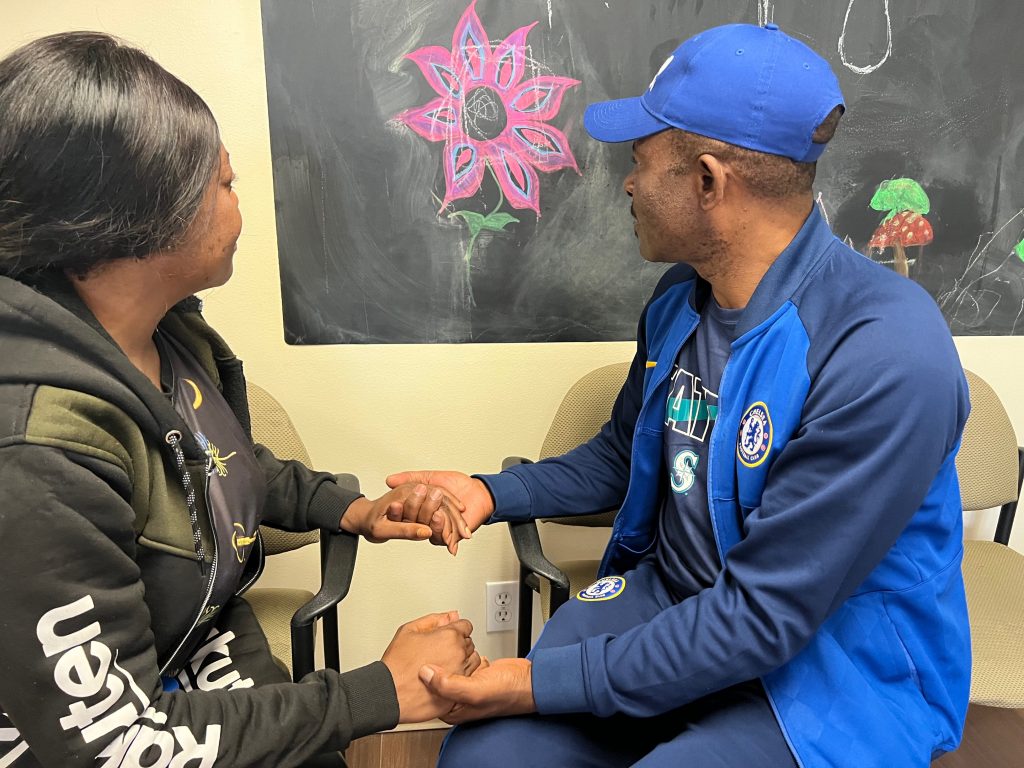
Surviving through prayer
The family decided to take a risk and leave the camp to live in Lusaka, the capital of Zambia. “We were in constant fear of getting caught and being sent to prison because we were living illegally outside the camp.”
As practicing Christians, they were sustained through prayer and trust in God as Bashale says, “We realized the only way we would survive was to pray to God. We fasted; we prayed overnight; we even climbed the mountain to pray.”
Others joined the family in prayer, and eventually two churches were formed which continue to meet today.
After 28 years of waiting, the family was finally notified by UNHCR that they had been accepted for resettlement in the United States. They arrived in Spokane in July. “The people in Spokane have been kind,” says Mwambi. “They accept us, give us shelter, give us food and help us with a lot of things.”
Hopeful for the future
World Relief has assisted the family in establishing themselves in Spokane by finding housing, setting up medical insurance, preparing the kids for school and providing information on how to find jobs. Bashale and Mwambi are currently working with a World Relief caseworker to get the necessary documentation to enable them to work. Bashale hopes to continue to serve God. “I have a passion for working for God here in America,” he says.
Although he does not have happy memories of their lives in Africa, Bashale is reflective about their experiences, “In every situation whether you’re happy, sad, suffering, rich – you still have to praise God for everything.”
Building a just world means coming alongside families like Bashale and Mwambi’s once they’ve reached the U.S., and it means finding lasting solutions to the problems that force families to flee in the first place.
Currently, there are about 30,000 immigrants from DRC residing in the United States. Four hundred live in Spokane. While we work to welcome and help newly arriving refugees and immigrants integrate into life in Spokane, World Relief’s team in DR Congo is addressing the drivers of mass displacement that often force families to flee in the first place.
We live in an interconnected world, and as crises converge, the only way to move forward is together. You can join World Relief Spokane as we build a more just and welcoming world by signing up to volunteer or partnering with us through a financial donation.
Another great way to discover what’s happening at World Relief Spokane is to join us for our Around the Table Gala on November 16. Register here.
The Long Road to Citizenship: Prince’s Story
Reflecting on September as the time of year that we celebrate citizenship with #CitizenshipDay, a day inviting, “Americans to reflect on the rights and responsibilities of citizenship,” we invite you to continue reading to learn about one of our own’s story, Prince Mushunju and his wife, Laurette!
Becoming a citizen affords a lot of privileges and is an arduous process that can be uncertain for some. Prince Mushunju, Employment Services Coordinator at World Relief Triad, reflects on his and his wife’s experience one year since they received citizenship.
“To experience the respect that is had for a U.S. citizen — Now that we have passports, we see a very big difference in the respect people give us,” he says. “We’ve traveled to the same countries! So we can see the difference. Americans don’t always appreciate their privilege in being born in this country.”
Searching for Home
When Prince and his wife first arrived in the United States in 2015, they were expecting their first child. After living in a refugee camp in Uganda for nearly 12 years, they were ready to find a home. They decided before they had even arrived that America would be their home. “We considered this to be our home. So one of the first things we did was ask the question of what can we do to become permanent residents. How do we become citizens? We asked this from the first year.”

Prince can’t help but smile when he reflects on those first few days and weeks arriving in the U.S. He says that they even thought that they were being resettled in New York City because that’s where their first flight was landing. After weeks of research, Prince then had to readjust to the idea of actually living in Greensboro, North Carolina — “very different from New York,” Prince laughs.
“They picked us up from the airport and took us to a small house,” he says. “But even still, the love of the country helped us. We knew we needed to get that citizenship to feel like we were home.”

Enduring towards Freedom and Joy
The journey towards citizenship involved a lot of work that Prince says made his wife and himself feel like they were back in school. Since they had to apply individually, there was always the fear that one of them might get citizenship while the other didn’t.
“We felt joy and freedom once we learned we’d gotten citizenship,” Prince says. “There are things a citizen can do that someone who doesn’t have a permanent status cannot do. Now that we’ve come as refugees, and have gone through that process as well as the process of becoming a citizen, we feel like, ‘Wow. I can breathe and start living.'”
One way major way that their lives have changed now as citizens is not only in the way they travel (Prince and his family are planning to visit the Democratic Republic of Congo soon so that his children can see where he comes from), but also in applying for their parents and other family members to come to the U.S. now.
“The process will be much easier as citizens and not refugees now,” Prince says. “As long as I’m working and don’t have a record, they can come.” He concludes with a smile that it should be less than two years until they are all reunited.
At World Relief Triad, we are invested in providing holistic care for our clients, which includes assistance in legal immigration services, often. If you would like to learn more about this program or give towards it today, click below.











